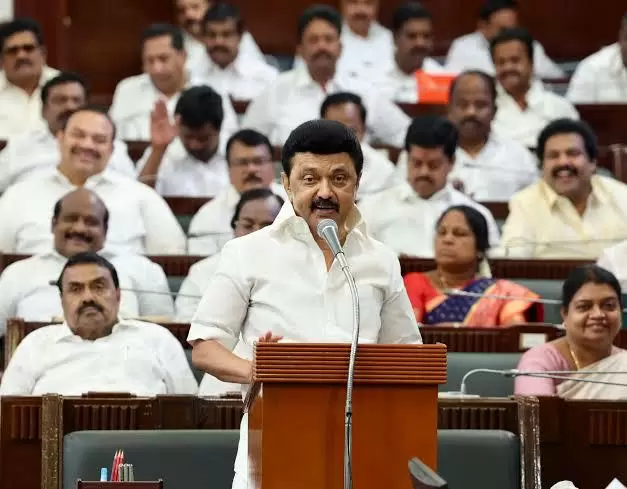How This Odisha Housewife Turned Santali Sarees into a Fashion Statement and Built a Rs 15 Lakh Business
Niroj Ranjan Misra
|
04-February-2025
Vol 16 | Issue 6
Pinky Majhi, a housewife from Odisha’s Mayurbhanj district, has transformed her love for Santali handlooms into a thriving business. Born and raised in a railway family in Rourkela, she graduated in 1993 and later settled in Bisoi, a small town about 48 kilometers away from Baripada.
Traditional Santali sarees are short in length and width, and they are thick, heavy, and coarse. But Pinky, despite having no formal training in fashion or textiles, has given them the look of a usual six-yard saree that is thinner, lighter, and softer.
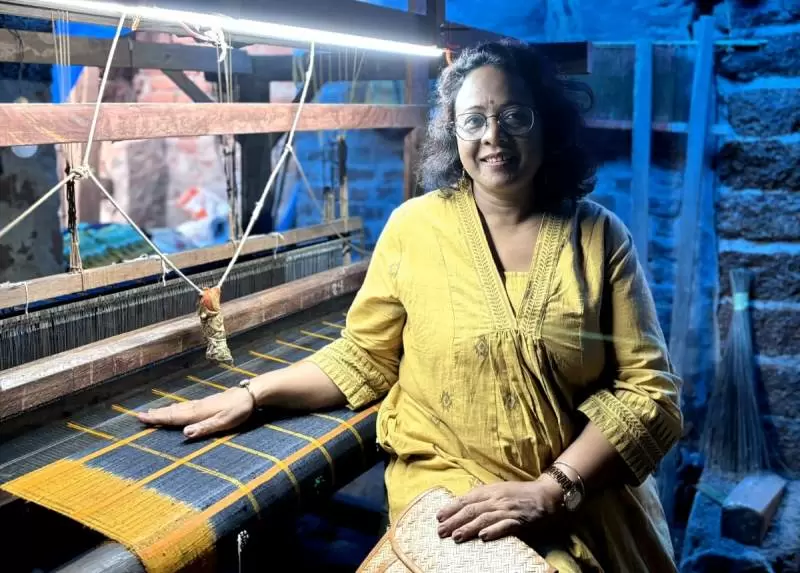
| Pinky Majhi started Gulachi Handlooms in 2022 with Rs 5 lakh (Photos: Special Arrangement) |
While Santali sarees have taken on a new form in Pinky’s hands, she has retained their traditional texture, with checks, bird, animal, and plant motifs.
Starting with a modest investment of Rs 5 lakh, her business now generates an annual turnover of over Rs 15 lakh through both offline and online sales. However, offline sales contribute more than 55% of the total revenue and they come mainly through sales in exhibitions.
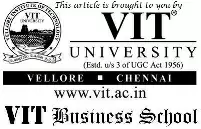
With support from her family, especially her son, and the expertise of designer friends, Pinky has expanded Gulachi Handlooms beyond sarees, introducing dupattas, stoles, handbags, and gamchas.
"Pinky is neither a professional fashion designer nor a trained textile engineer,” said Deepak Kumar Beshra, founder and chairman of the Santali Art and Film Development Association in Baripada, the district headquarters of Mayurbhanj.
“She does not rely on aggressive marketing strategies. Instead, she depends on her natural sales skills and the support of her family and friends. This has helped her carve a niche in both the tribal and non-tribal competitive textile market that is profusely volatile."
Traditional Santali sarees, woven from low-count cotton, are shorter in length, covering only up to the knees instead of the usual six yards. They measure less than 5.5 metres in length and 39 inches in width.
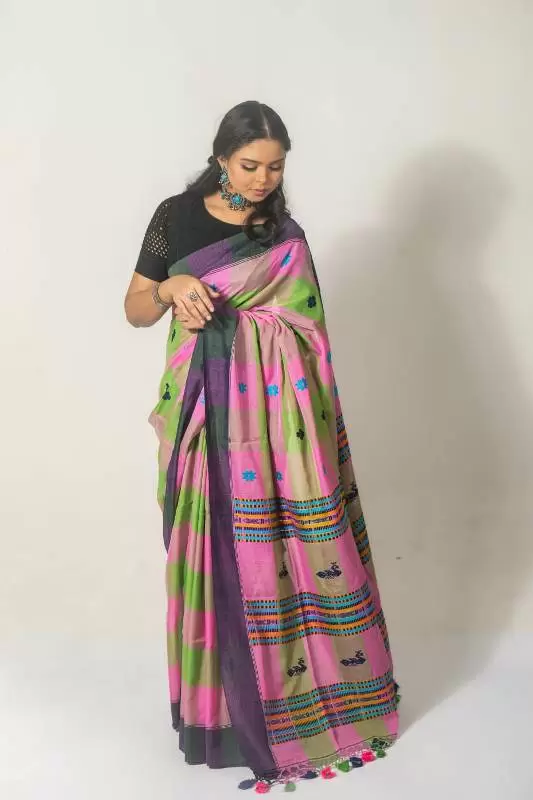
| A well-wisher in one of Pinky's sarees |
In contrast, sarees from Pinky’s Gulachi Handlooms are over 6.5 metres long and 42 inches wide. Made from mercerized cotton, they are softer, lighter, and more comfortable to drape.
‘Gulachi’ is a sacred flower for the Santal tribe, used in pujas, weddings, and all auspicious occasions. "When I decided to give Santali textiles a new texture, I chose to name my startup after this flower," said Pinky.
“I chose Bisoi over the bigger towns of Baripada and Rairangpur because my in-laws live here. Apart from my emotional connection to Bisoi as a daughter-in-law, I felt that if my startup ever faced any difficulties, my in-laws would be there to support me. But thankfully, I never had to rely on that, as my business has been growing steadily," she said.
Pinky is a graduate from SKDAV College in Rourkela, where her father, Muchiram Majhi, worked for the Indian Railways. Despite having no formal training in fashion or textiles, her creativity and the support of handloom designer friends like Bhubaneswar-based Choudhury Jyoshna Das have helped her develop more than 30 designs, giving Santali textiles a modern touch.
“I only give suggestions on the types of designs, colours and fabric that are most preferred in contemporary market. Besides, I apprise her of different business opportunities I come across. However, she develops her own designs,” said Jyoshna, the managing director of Bivabari Fashions Pvt. Limited, Bhubaneswar.
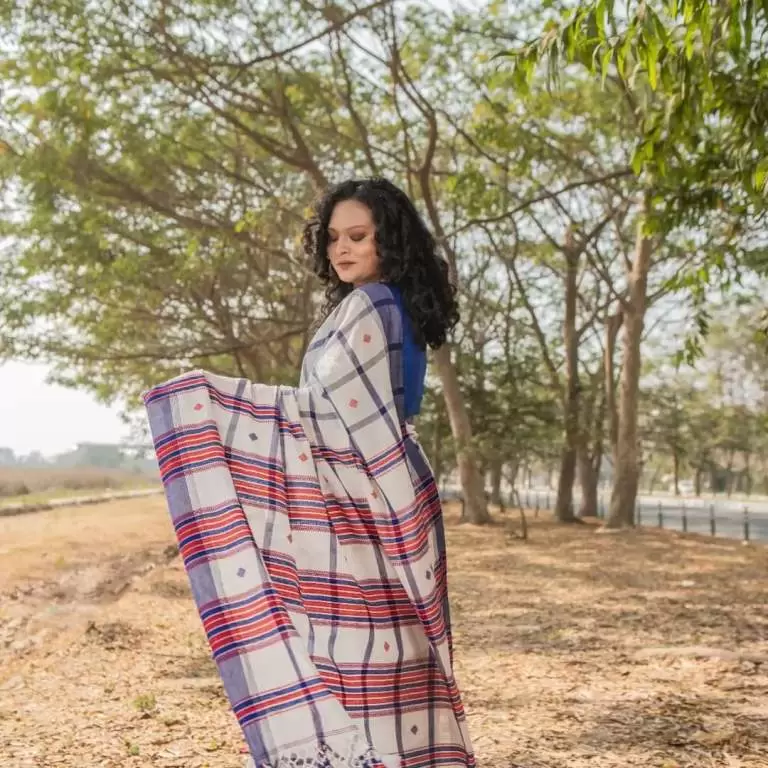
| Santali sarees have taken on a new form in Pinky’s hands |
Pinky continues to focus on checks, one of the fundamental decorative elements of Santali sarees. In addition, she has improvised over 20 traditional motifs, including flowers, birds, animals, leaves, and plants.
Though sarees remain the mainstay of Gulachi Handlooms, other products like dupattas, stoles, and handbags have also become part of its collection. For cotton textiles, she works with weavers in Gopalpur, Jajpur district, while the weaving of tassar sarees is primarily handled by two to three master weavers in Nadia, West Bengal. Each of these master weavers has around 30 to 40 weavers under them.
“I make not only cotton sarees but also dupattas, stoles, gamchas, and handbags with Santali designs. Though the demand for these fabric products is lower than sarees, both tribals and non-tribals buy them during exhibitions. I create them from old and unsold sarees, giving them a Santali texture," said Pinky.
Marketing was initially a tough challenge, as polyester Santali textiles, priced as low as Rs 500, dominated the market. However, with the support of her eldest son Ratnakar Marandi, two employees at her Bisoi outlet, and her friends, she has successfully entered the market through exhibitions, fairs, and festivals. Here, most customers prefer her textiles over polyester alternatives.
Her two employees, who each earn a monthly salary of Rs 6,000, have been with her since the beginning and manage the entire setup with dedication. Additionally, her son Ratnakar, who runs the high-end hotel Three Kings in Bhubaneswar, plays a key role in marketing his mother’s products.
“I manage our stalls during exhibitions in Bhubaneswar, as well as in Ranchi and Jamshedpur in neighbouring Jharkhand. On an average, we participate in five exhibitions every year. Apart from exhibitions, I solely handle the marketing of my mother’s products in Bhubaneswar," said Ratnakar.
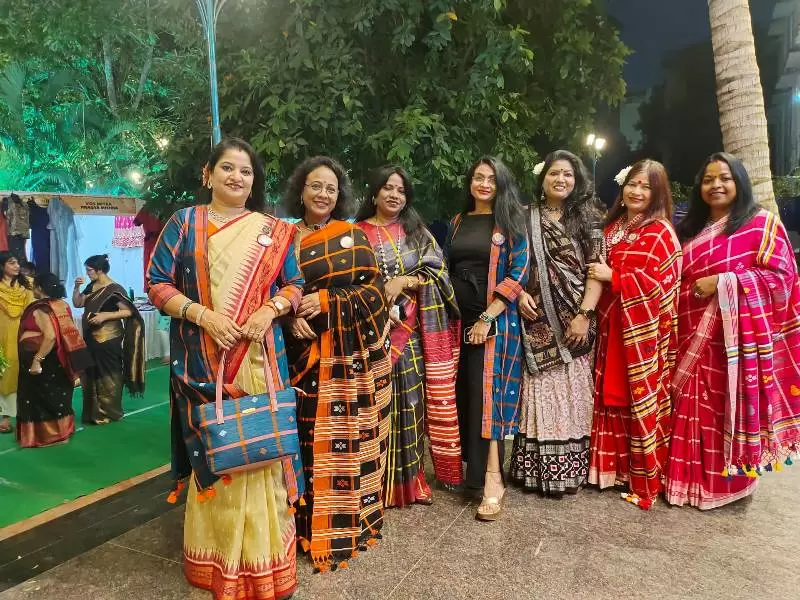
| Pinky and her friends draped in Gulachi sarees |
Pinky has also established her presence in the market through social media. Many Odias settled in countries like the USA learn about her products through social media and word-of-mouth publicity. Some even buy in bulk, spending Rs 40,000 to Rs 50,000 at a time whenever they visit their home state.
The minimum price of her cotton sarees is around Rs 2,500, while golden zari-embroidered tassar sarees, polyester-mixed tassar sarees, and pure tassar sarees are priced at Rs 3,000, Rs 6,500, and Rs 8,500, respectively. Similarly, dupattas and stoles cost Rs 1,200 each, handbags start at Rs 800, and gamchas are priced at Rs 300.
"I make nearly 60 tassar sarees, 200 polyester-mixed sarees, and 30 to 40 gamchas for her every year," said weaver Sangram Dutta from Gopalpur. "It takes me a minimum of two to three days to weave a saree. However, the time required depends on the intricacy of the designs suggested by Pinky madam," he added.
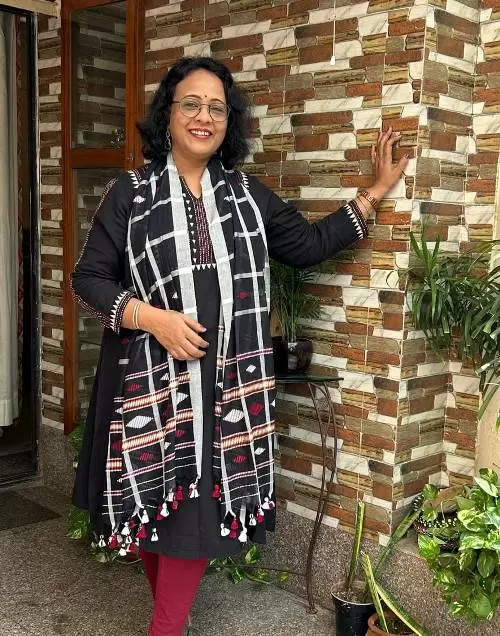
| Pinky showcasing a Gulachi stole |
Pinky is now planning to open her own outlets in a few towns. “Our first outlet will be in Baripada, followed by Rairangpur, a sub-divisional headquarters in Mayurbhanj. Opening an outlet in Bhubaneswar will take more time, as it requires careful planning and a larger investment due to the city's higher costs,” she said.
“Pinky’s ability to manage people was evident during railway employee functions, where she played a key role. This skill has been a major factor in her business success, even though it has grown gradually,” said her husband, Dayanidhi Marandi, retired chief manager of the Mancheswar Railway Workshop in Bhubaneswar. - ©TWL














